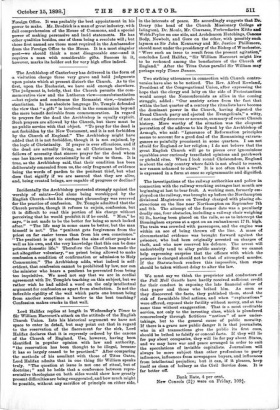Incidentally the Archbishop protested strongly against the worship of saints—God
alone being worshipped by the English Ohurch—but his strongest phraseology was reserved for the practice of confession. Dr. Temple admitted that the Church permits, though it refuses to enjoin, confession, but it is difficult to read this portion of his charge without perceiving that he would prohibit it if he could. "Man," he eays, "is not made to be the better for being so much looked after." "The life may in some cases be better, but the man himself is not." The "penitent gets forgiveness from the priest on far easier terms than from his own conscience."
The penitent is apt to confess the sins of other people as well as his own, and the very knowledge that this can be done poisons domestic life." Therefore the Church has made the act altogether voluntary, "no priest being allowed to make oonfession a condition of confirmation or admission to Holy Communion." The Archbishop adds, what indeed is self- evident, that confession cannot be prohibited by law, nor can the minister who hears a penitent be prevented from being too inquisitive. We need not say that we are in cordial agreement with Dr. Temple's teaching on this subject, but we rather wish he had added a word on the only intellectual argument for confession as apart from absolution. Is not the inflexible rigidity of the wall which parts one human being from another sometimes a barrier to the best teaching Confession makes cracks in that wall.






































 Previous page
Previous page